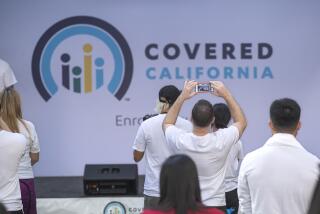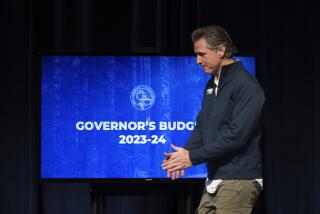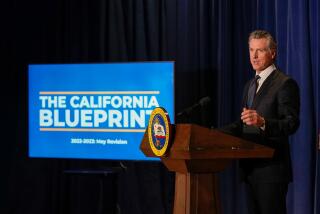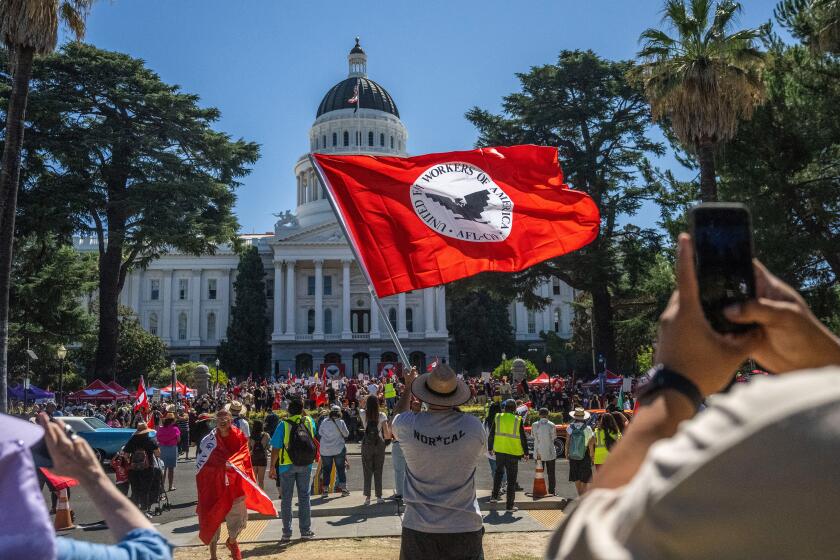Legislature Grapples With 11th-Hour Bills
Lawmakers were close Thursday to approving an extension of government-funded health care coverage to 600,000 low-income working parents, and they grappled in the final hours of their session with issues ranging from gambling to new protections for farm workers.
Even as legislators worked late into the night, Gov. Gray Davis was considering vetoes of bills, particularly ones opposed by business groups. One such measure would impose sales taxes on bookstores and other retailers that establish Internet sales sites outside California.
Another bill apparently headed for a veto would increase unemployment benefits to a maximum of $380 a week from the current $230. A third with dubious prospects would increase workers’ compensation benefits to a maximum of $651 from the current $490 a week.
The workers’ compensation system was deregulated in 1993 under then-Gov. Pete Wilson. Although organized labor backed the current package, there was no agreement from business and insurance companies on the measure, prompting the bill’s author to predict a veto.
“It’s important to make a statement that benefits need to be increased,” said the author, Sen. Patrick Johnston (D-Stockton).
After a week of marathon sessions, several lawmakers were spent but still deciding the fates of more than 140 bills Thursday.
Perhaps the most far-reaching measure involved health care for low-income workers. A package of three bills was moving through the Legislature. Two had passed; a third was awaiting almost certain passage in the Senate. Davis had not indicated if he would sign any of them.
The state Senate gave final approval, 31 to 3, to a nonbinding resolution urging that the Democratic governor apply for almost $600 million in federal money to help pay for health care coverage for as many as 600,000 low-income working parents in the Healthy Families program, begun three years ago under the Republican Wilson.
The state’s share of the coverage would be about $400 million a year--a price tag that gives Davis pause. Advocates of the program note that a fourth of California’s populace lacks health insurance.
“We miss the boat if we don’t look at it as an investment,” said Assemblyman Martin Gallegos (D-Baldwin Park).
Sen. Ray Haynes (R-Riverside) called on the state to turn back the federal money, arguing that Healthy Families has not met its goals and “is well on its way to being a failure,” and that private health insurance companies could better serve Californians.
State Fund for Farm Workers
In other far-reaching action, the Legislature approved bills that would increase licensing requirements for farm labor contractors, and provide a fund that farm workers could tap when they don’t get paid.
“Farm workers will finally be protected from bad labor contractors,” said Assemblywoman Sarah Reyes (D-Fresno).
Earlier this week, lawmakers approved measures to help defray soaring electrical bills in San Diego, and boost state-funded college grants for high school graduates. Surveying the work, Speaker Bob Hertzberg (D-Sherman Oaks), who took over the lower house in April, proclaimed Thursday: “This far exceeds my expectations in terms of what we’ve been able to do.”
Although lawmakers take pride in bills affecting the entire state, much of what they do is purely local. Los Angeles was a particular focus of attention Thursday.
Legislators and county lobbyists met into the night in an effort to resolve the fate of Los Angeles County-USC Medical Center. A deal appeared near. Supervisors had hoped to limit the hospital to 600 beds. Eastside lawmakers and Hertzberg pushed for 750 beds.
In a potential compromise, the county would build a second 80-bed hospital in Baldwin Park, and consider rebuilding the women’s hospital next to County-USC. The state would help pay for running the facilities.
At the same time, a bill by Assemblyman Roderick Wright (D-Los Angeles) pending in the Assembly would turn over control of the Los Angeles Memorial Coliseum to the state, taking it away from a commission of county, city and state representatives. The Senate approved the measure, AB 260, on a 21-15 vote.
Dozens of lobbyists packed the Capitol halls, buttonholing members with last-minute pleas, keeping vigils to ensure that agreements already consummated remained sealed.
“I’m here till they bang the gavel,” said Ed Worley, a National Rifle Assn. lobbyist who remained wary that a bill to license gun owners, dropped earlier in the week because of Davis’ veto threat, might be revived. Assemblyman Jack Scott (D-Altadena) said he would wait until next year.
As happens in the crush of business on the last days of most sessions, there were several eyebrow-raising moves.
One pending bill would guarantee that smokers could not be discriminated against in employment. Some labor lobbyists support it, as does the tobacco industry. County lobbyists oppose it, contending that they should be able to take into account whether someone smokes for such professions as firefighting.
The full Legislature approved a measure, backed by increasingly powerful Indian tribes, to block a proposed dump in northern San Diego County that would be built at the foot of a mountain that Indians view as sacred. It also is in the vicinity of planned tribal casinos, though tribal leaders say any potential effect on their businesses had nothing to do with their opposition.
“It’s not something we’ve just conjured up,” said Pechanga Chairman Mark Macarro, adding that tribes had opposed the long-planned dump on religious grounds more than a decade ago, before they entered the gambling business.
The author of AB 2752, Assemblyman Dennis Cardoza (D-Merced), all but ensured that the bill would pass when he used his influence to bypass one committee that normally would hear bills dealing with landfills, in favor of a friendlier committee.
“Totally a leadership call,” said Assemblyman Howard Wayne (D-San Diego), whose Natural Resources Committee was bypassed and who denounced the bill. “I’m not happy about it.”
Several measures dealt with gambling in one form or another. A bill, AB 1416, by Assemblyman Herb Wesson (D-Culver City) would supersede an aspect of a 1999 state Supreme Court decision and allow card clubs to continue operating.
For many lawmakers, Thursday marked the end of their legislative careers. Johnston, an inveterate baseball fan, left hardballs at each senator’s desk, autographed by him with personal notes. Outgoing Sen. Tom Hayden (D-Los Angeles) was fuming over electricity measures the Legislature approved, including one that earmarks $150 million in what he says is a subsidy for San Diego Gas & Electric.
“I’m trying to control my rage. It’s not easy,” Hayden said.
Termed-out Assemblyman Brett Granlund (R-Yucaipa) said he would be looking for work, but first had far more important business: “The salmon are running like crazy at Bodega Bay, and my boat leaves at 5:30 a.m.”
Others were leaving to campaign full-time for the next two months. Democrats, with strong majorities in both houses, expect to maintain control in 2001. Republicans were taking a realistic view.
“We have a daunting challenge,” Assembly Republican Leader Scott Baugh of Huntington Beach said, expecting to be outspent significantly.
In several instances, legislators approved bills viewed as partial solutions, rather than allow measures to die.
They revisited the issue of protecting personal privacy in the information age, the subject of countless bills this year, most of which have been defeated by financial interests.
The Assembly approved legislation, SB 129 by Sen. Steve Peace (D-El Cajon), to pass a watered-down series of protections on personal information. It would establish within the Department of Consumer Affairs the Office of Privacy Protection, which would work to protect the privacy of individuals’ personal information.
Assemblywoman Sheila Kuehl (D-Santa Monica), whose privacy legislation died earlier this year, said the bill did not go far enough. But after the blood bath incurred by privacy bills this year, she said, it was better than nothing.
“There are a lot of people making a lot of money from selling your information,” Kuehl said.
Lawmakers again waded into the controversy over racial profiling by police. A bill, SB 1102, that seeks to combat the problem by increasing police diversity training won final approval in the Senate, 25 to 2.
Sen. Kevin Murray (D-Los Angeles) withdrew a previous attempt at fighting complaints that police pull minorities over for simply “driving while black” when it came under attack by a host of national civil rights figures, including the Rev. Jesse Jackson.
Critics complained that the compromise between Murray and Davis did little to address racial profiling, because it failed to require data collection on police stops to determine the extent of the problem.
The latest version authorizes a report from the independent legislative analyst on the issue, and requires that police receive extra “cultural diversity” training to prevent the likelihood of racial profiling stops. Senate President Pro Tem John Burton (D-San Francisco) voted against the measure, labeling it a “placebo.”
But Murray pressed: “It’s a good start, and we will continue our fight.”
(BEGIN TEXT OF INFOBOX / INFOGRAPHIC)
Other Legislative Action
Measures that received final legislative approval Thursday and headed for the desk of Gov. Gray Davis included:
Lemon Cars--A bill to update California’s “lemon law,” making it easier for people who purchase faulty cars to get refunds. SB 1718, by Sen. Byron Sher (D-Stanford), would allow customers to get refunds after taking a car in for two repairs of critical systems such as brakes or steering. After initially opposing the measure, Ford, Toyota and other auto makers backed off.
Immigrant Students--An Assembly measure permitting immigrants who are California residents and are applying for citizenship to attend California colleges and universities at the same cost as in-state residents. The legislation is AB 1197 by Assemblyman Marco Firebaugh (D-Los Angeles).
Teachers--A package of bills aimed at encouraging veteran public school teachers to remain on the job by boosting their retirement benefits. The bills, which Davis is likely to sign into law, encourage teachers to remain on the job for at least 25 years by giving them extra retirement pay. Teachers with 30 years on the job would get an extra $200 a month, and teachers who remain for 32 years would get an additional $400 a month.
Boot Camps--A $9.2-million bill by Sen. Adam Schiff (D-Burbank) would create a boot camp for juveniles who use firearms. The legislation, SB 1542, would apply to first-time juvenile offenders 15 or older who used a firearm at school or at an off-campus school activity. The “Turning Point Academy,” supported by Davis, would be run by the California National Guard and offer physical training, drug screening and counseling.
Body Parts--A measure to prohibit California coroners from releasing body parts for scientific research and training without obtaining the consent of a representative for the dead person or making a reasonable effort to find such a representative. The bill, AB 2397 by Assemblyman Ken Maddox (R-Garden Grove), was sparked by news articles uncovering problems with the Willed Body Program at UC Irvine.
Film Industry--Assemblywoman Sheila Kuehl (D-Santa Monica) carried AB 484, a bill to give the state Film Commission authority to reimburse costs incurred by local governments when production companies use their jurisdictions in television and movie shoots. The cost is $15 million.
*
Times staff writers Dan Morain and Julie Tamaki contributed to this report.
More to Read
Get the L.A. Times Politics newsletter
Deeply reported insights into legislation, politics and policy from Sacramento, Washington and beyond. In your inbox three times per week.
You may occasionally receive promotional content from the Los Angeles Times.






